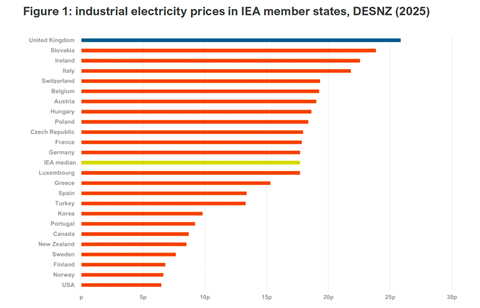This summer could see discussion over electricity prices and whether the government should change the way it manages its low carbon support so the price of electricity is lower, in comparison with gas. New analysis from energy lobby group EnergyUK suggests that one option for reform could reduce non-domestic electricity prices by around £40/MWh, cutting electricity costs for businesses by up to 15%.
At issue is the way government recoups so-called ‘policy costs’ – measures such as the feed-in tariff, the Renewables Obligation and the Capacity Market. All the costs of these and other measures are paid by electricity customers via levies on their bills. However this is an anomaly: it raises the cost of electricity and makes it less attractive, slowing the move away from high-carbon options such as heating with gas. Along with other factors, such as the price of gas used to generate power, policy costs raise electricity bills for UK customers and EnergyUK says UK electricity prices are among the world’s highest.
Moving policy costs has been a subject of discussion for many years, but if moved to gas bills the change would raise costs most for domestic and business customers who are least able to switch.
Recent publications suggest proposals to switch are gaining momentum.
In its advice to government on the basis of its seventh carbon budget, published on 26 February, the Climate Change Committee (CCC) highlighted ‘making electricity cheaper’ as one of 43 priority recommendations to put the country on track. It said, “The largest share of emissions reduction in our pathway comes from switching to low-carbon electric technologies across sectors including transport, buildings, and industry. Households and businesses need to be better incentivised to make these choices through the impacts they will see on their bills. This can be done through rebalancing prices to remove policy levies from electricity bills.”

In 2024, Energy UK developed proposals for rebalancing policy costs for domestic customers by moving most environmental and social levies onto gas, while moving some to government spending to mitigate distributional impacts. Its new analysis examines the effect for businesses.
It says the disparity between electricity and gas prices situation has worsened, “with the average electricity-to-gas price ratio rising to between 4:1 and 5:1 over recent years, up from just over 3:1 in 2012”. It put forward proposals which it said would reduce non-domestic electricity prices by around £40/MWh, cutting electricity costs for GB businesses by up to 15%.
It is possible that government will explore the option of moving policy costs in the next few months. This is because it is expected to publish a key policy document on the future of home heating. The burden of policy costs on domestic electricity customers acts to discourage them from taking up low-carbon electric heating solutions such as heat pumps – a key plank of government heat policy - because it does not look attractive compared with gas heating. And while a new policy could change domestic customers’ decisions on home heating, it could also change the economics for businesses considering whether they should go electric.
EnergyUK said, “It is vital that Government consults on options to rebalance non-domestic electricity and gas bills this year and allocates funding for it in the Spending Review to keep British businesses in the UK and achieve legally binding carbon budgets.” Watch out for a debate.


















